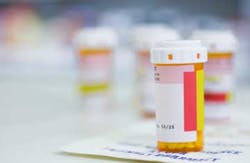Western pharmaceutical companies are coming under increased scrutiny in China following the bribery accusations leveled last month against GlaxoSmithKline (GSK). Two Danish drug manufacturers have joined the list of companies to receive visits from Chinese authorities in a sign that life could get even more difficult for Western pharma companies operating in the country, Reuters reported.
One of the Danish companies is none other than Novo Nordisk, which happens to be the biggest insulin maker in the world. During its second-quarter earnings presentation yesterday, Novo Nordisk revealed that officials from the local Administration for Industry and Commerce (AIC) had paid a visit to the company's production site in Tianjin. CFO Jesper Brandgaard said that the inspection took place on Aug. 1 and the AIC requested information about Novo Nordisk's Chinese operations. The company has not been accused of any wrongdoing and its Chinese headquarters have not been visited. Brandgaard added that Novo Nordisk had no knowledge of whether it had been subjected to a routine inspection or had come on the authorities' radar as a result of the GSK probe.
The other Danish company to get caught up in the net is H. Lundbeck, whose Beijing unit was visited by local authorities. Meanwhile, a Chinese newspaper has run a report accusing French pharma major Sanofi of bribery. The material was based on information provided by an unnamed source, who claimed that Sanofi had greased the palms of hundreds of Chinese doctors in 2007. It was alleged that the company had spent some 1.7 million yuan (about $278,000) on bribes: a claim Sanofi said it took "very seriously."
RELATED: Chinese pharma industry eyes international opportunities
GSK was accused last month of dispensing bribes among doctors, hospitals and government officials. According to the Ministry of Public Security, the UK pharmaceutical giant did this in order to push more drugs at higher prices. GSK said there was a possibility that some local managers had fallen foul of the law, adding that the company was cooperating with the authorities. Four GSK executives in China have been detained by the police, while at least 18 other employees have been questioned. GSK has allegedly used travel agencies to distribute as much as three billion yuan ($490 million) in bribes to doctors and government officials.
Other companies have also felt the heat. An AstraZeneca sales executive was arrested in Shanghai and authorities paid visits to the local premises of Eli Lilly and UCB. The inspections have been taking place alongside a review conducted by the powerful National Development and Reform Commission, which is looking into the pricing practices of 60 local and international drug manufacturers.
Reuters went on to add that the ripples of the GSK probe would have a negative impact on the local growth of pharma multinationals. The news agency was citing industry analysts at Wells Fargo Securities, who were in turn basing their predictions on views expressed by a China expert at law firm Ropes & Gray. It is now expected that Chinese authorities will seek to introduce stricter price controls, which could halve the annual growth rate of local drug sales to 10% or so from a historical 20%.
